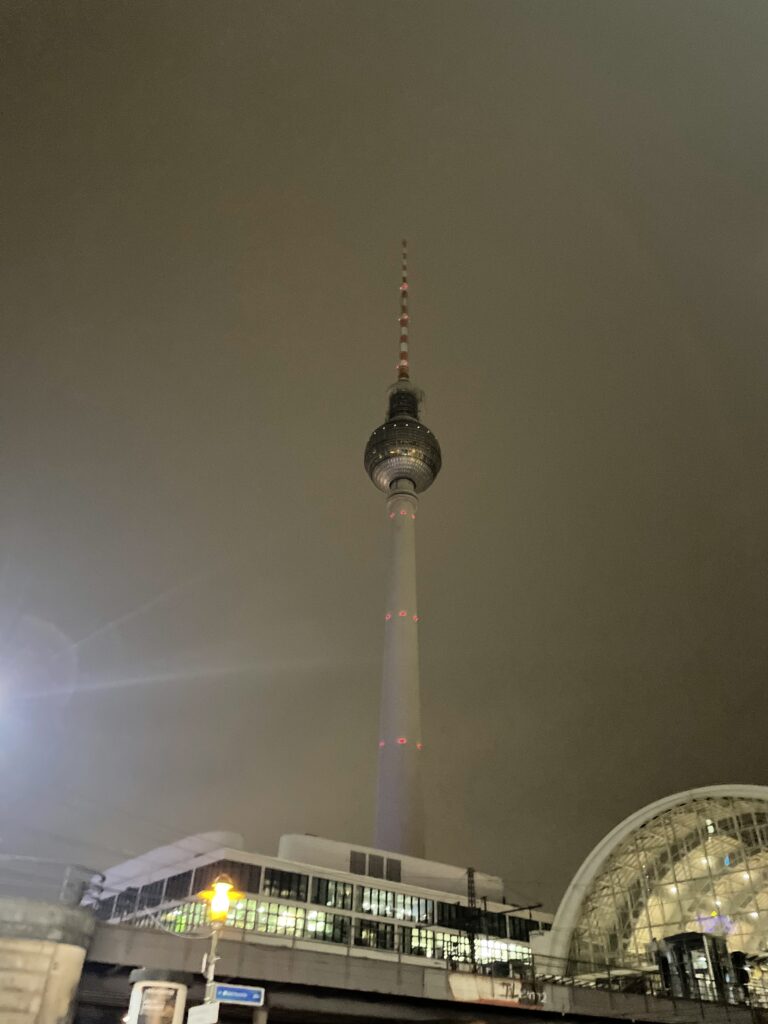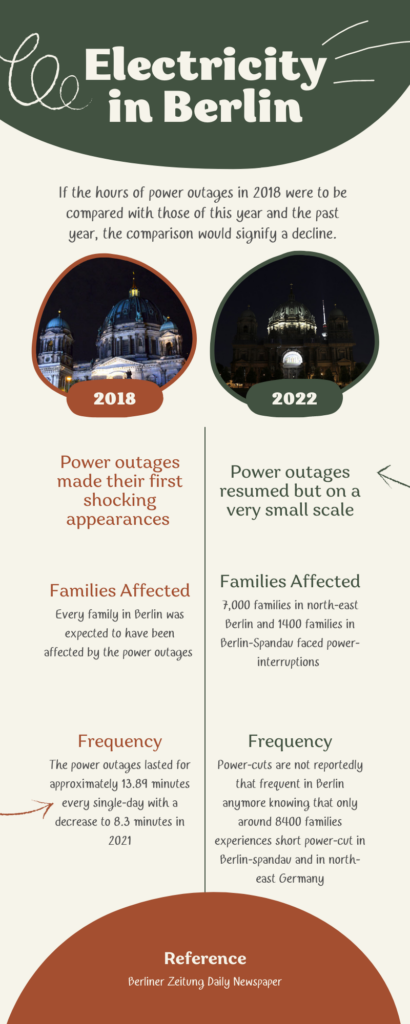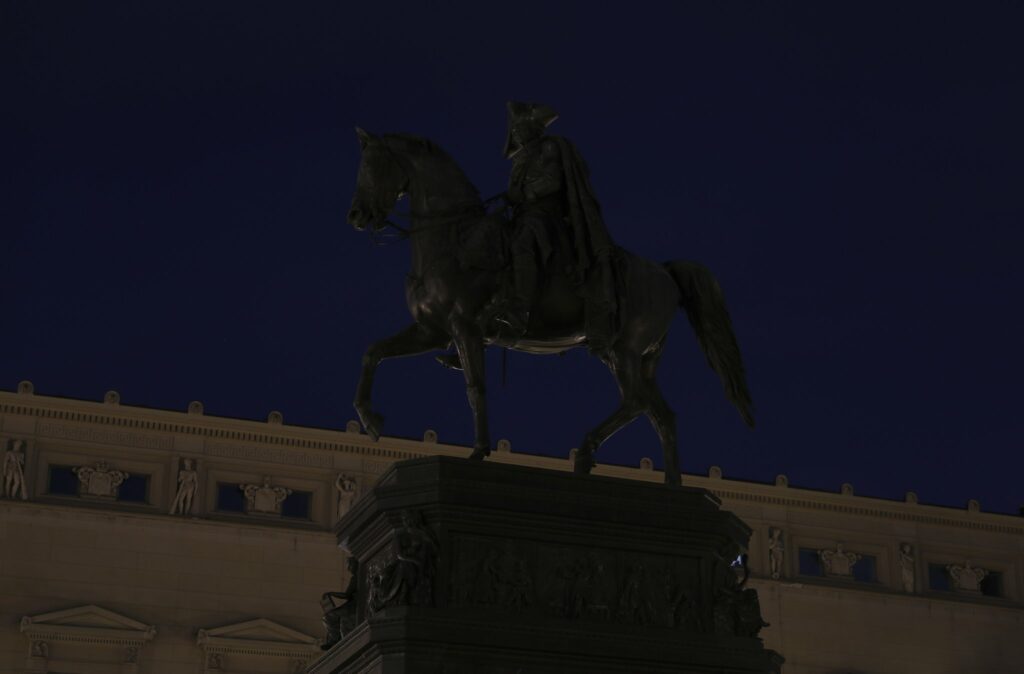By Chelsea Al Arif and Lyne Samury
Berlin, December 2022

Upon arriving in Berlin at night, you are welcomed by the unlit Television Tower, the turned off Berlin Brandenburg Gate, and the half-lit street highway lights. While all this may seem like a dead-end for Germany’s capital, its citizens show you the opposite with their vibrant night-life, lit up homes, and unprecedented traffic. But at a time when the media bombards you with news on Germany’s dependence on energy, and the so called, regular black-outs, if you ask the Berliners about the electricity state, the first reply you would get from them is, “yes? What about it?”
Previous governments, according to German Minister for Economic Affairs and Climate Action Robert Habeck, made a “mistake,” and consequently, the country now is reported to face the urgent task of getting enough fuel to avoid winter outages. In the long run, however, Germany is expected to form several new energy alliances and invest in renewables to attain energy independence.
While many might think that these frequent power-outages are due to the crisis facing Berlin’s electric system, Stromnetz Berlin, the network operator, refuted and suspected that there was a cable problem or that another firm had damaged the subterranean lines.
Germany is a significant net importer of energy, with 70% of its energy emerging from imports of fossil fuels and uranium. The country, in particular, was hardly struck by Europe’s energy crisis following Russia’s invasion of Ukraine. To be more specific, at the start of 2022, Russia still supplied Germany with more than half of its hard coal and natural gas supplies, as well as 34% of its oil supplies.
Prior to the Russian invasion of Ukraine, Germany relied on Moscow for more than half of its natural gas and coal, as well as one-third of its oil. A subsidiary of Russia’s state energy firm Gazprom held Germany’s biggest gas storage tank, the size of 910 football fields, which had been emptied by the start of the war and was only around 5% filled as Moscow restricted delivery. Russia also possessed the country’s most significant national gas transporter and the refinery that supplied critical fuel supplies to Berlin.
While taking into account that articles published by several media outlets internationally show that Germans and particularly Berliners are overwhelmed by the power outages, the reality offers a counter argument. They are not really aware of a crisis. And if they are, they do not care.
“It’s funny, the first time I heard of an electricity crisis in Berlin was when you contacted me for an interview! I had to research a bit about the reality of those power outages to discover that everything I read on the internet was really new to me. The prices are increasing, but that is only normal knowing that the conflict with Russia has a great deal of influence on us”, said Alicia Khaskei, a 26-year old German citizen born in Berlin.
Amidst our hunt for answers regarding the preparedness of Berliners to combat the cold with the power outages this winter, a shocking revelation highlighted that they are not preparing! What was the reason behind their cold reactions? Well, they did not believe the energy crisis was that serious and required much attention.
Reality or Exaggeration: Germany’s supposed struggle to achieve “energy autonomy”
Following Russian President Vladimir Putin’s invasion of Ukraine, the Foundation for Climate and Environmental Protection became a symbol of how Germany’s desire for natural gas led to a reliant, ambiguous relationship with Moscow. The foundation was just one cog in a vast Russian influence network in Germany, which grew in lockstep with the country’s increasing reliance on gas.
Some of Germany’s most prominent former politicians, as well as foundations, sports clubs, and cultural groups around the country, were inundated with Russian money. Gazprom and its subsidiaries funded soccer and volleyball teams, a sailing competition, a classical music festival, art galleries, and even “Blue Fire,” Germany’s largest amusement park’s natural-gas-themed roller coaster.
Germany’s earliest purchases of Russian gas date back more than a half-century, but Chancellor Gerhard Schröder was at the center of the growing entanglement. Schröder used his final days in office in 2005 to finalize an agreement to develop Nord Stream 1 before joining the pipeline company’s board nearly immediately. His ties to the Kremlin have long been criticized in Berlin, including a party of his 70th birthday with Putin in St. Petersburg only weeks after Russia took Crimea in 2014.
While some anticipated his successor, Angela Merkel, to try to lessen Germany’s energy dependency on Russia, tried to deepen her connections throughout her 16 years in power, with Russian gas imports still increasing even as her government committed to phase out nuclear and coal.
Reality or Exaggeration: Are there really daily electricity disruptions?

Surprisingly Genta Mur, a 28-year old German-Albanian citizen born in Berlin, says, “I do not really understand what the hype is actually about. Yes, the monuments and museums are facing darkness at night but our homes and industrial institutions are not. If you read off of social media, you would think we are living in darkness reigning our homes.” “It is indeed sad to see the usual gardens, statues, and monuments turned off during certain periods of the day due to the energy crisis and fluctuations in fuel prices. However, this issue has not yet reached our homes,” she adds.

Reality or Exaggeration: Why is a power outage expected even though Berliners are not worried?
“We have to assume that there will be blackouts in winter,” Ralph Tiesler, chief of the Federal Office for Civil Protection and Disaster Assistance (BBK), sounded the alarm on November 19. And while his warning received significant backlash from several citizens, Tiesler fixed his statement to say that only regional and temporary power outages, “brown-outs”, are to be expected.
There are substantial distinctions between power outages, blackouts, and brownouts all across Germany. Experts believe that a widespread outage is “extremely unlikely.” Nonetheless, several cities, and municipalities outside Berlin, are reportedly prepared for multi-day disaster circumstances, while this can be hardly observed in the capital city.
The controversy continues: is the issue of power outages as serious as it is being documented exaggeratedly? The media, authorities, and public officials say yes, the problem is serious. The citizens and Berlin residents say “not as much as it is said to be.”
Alicia adds, “if you actually go out and ask the Berliners about the energy crisis, they will either act clueless, normal or laugh at you. Yes, the prices are rising, but most of the people I know do not care and are accommodating with the prices. The thing is, Berlin is a work-city, people are always busy working. That is all they care about.”
Reality or Exaggeration: Is there really an increased demand for power generators in Berlin?
“We have a 1,000% rise in sales for small appliances compared to 2019,” says Kai Hoffmann, one of the managing directors of the Berlin firm HO-MA Notstrom. As a result, aggregates of this size are generally sought for by private persons. They are normally priced at least 1,000 euros. “Many people want to protect themselves, have emergency electricity at home, and have their heating function in an emergency,” Hoffmann explains.
The increased demand trend has been visible since the start of the corona outbreak, and it has suddenly surged after because of the rise in gas prices as a result of Russia’s actions against Ukraine.
However, the German authorities do not believe that a large-scale blackout is imminent in Germany and so do the German citizens who, according to many, believe that the increase in generator demand is just a “phase” that ended as most have agreed to paying the surging electricity prices.
But, whether realistic or not, an increasing number of businesses are requesting emergency generators. Demand in this area has lately surged by a factor of three at HO-MA Notstrom. What is remarkable is that an expanding number of industries desire to defend themselves, which previously did not play a significant role.
This may be seen in industrial organizations, as well as during the digitalization of various operations. “They have no need to safeguard themselves, but they calculate that a day’s power outage will cost 100,000 euros, and many then think to themselves: the more expensive it is, the more valuable a unit is,” Managing Director Hoffmann explains.

Reality or Exaggeration: What about the new 15-year electricity deal with Qatar?
German corporations have inked a 15-year agreement to buy 2 million tonnes of liquid gas from Qatar, sending confusing messages about Germany’s concern for human rights in the Gulf and its dedication to a carbon-neutral energy source, especially post the rising controversies surrounding Germany’s expressive stance during the World Cup.
The agreement was announced by Qatar Energy, and supplies will begin in 2026. Qatar will sell the gas to the US business ConocoPhillips, which will transfer it to the LNG facility in Brunsbüttel, Qatar’s energy minister announced in Doha.
Germany has been one of the countries most critical of Qatar’s treatment of LGBTQ individuals, as well as the working conditions of stadium construction workers, during the World Cup. However, economics minister and Green Party member Robert Habeck has stated that, in order to wean itself from Russian gas imports, Germany must acquire its energy from a variety of sources.
Habeck traveled to Doha in March, but disagreements over contract duration prevented an agreement from being reached, with Qatar proposing a 25-year deal and Germany seeking something much shorter. “Fifteen years was amazing,” he stated on Tuesday. They appear to be in favorable conditions.”
Germany is constructing four emergency floating LNG facilities to dump liquid gas. The imminent building of permanent terminals has been stymied by planning delays, but it is finally proceeding, expanding Germany’s capacity to diversify its energy supplies away from Russian pipelines.
Qatar’s gas will not arrive in time to help Germany escape energy shortages this winter and maybe the next winter. Germany is now optimistic that it will avoid power disruptions this winter, but less certain that it will have sufficient reserves to avert power cuts in 2023 and 2024.
Qatar is one of the world’s top liquified natural gas suppliers. After Russia and Iran, the emirate holds the world’s third biggest gas reserves. Qatar and Iran share the world’s biggest gas field, which is located off Qatar’s coast.
Reality or Exaggeration: Has President Putin’s plan to scare the West failed?
On a side note, knowing that the inability of Germany to achieve energy autonomy dates back to its dependency on Russia, the recent escalations with Ukraine pave the way to an essential question: Has President Putin’s plan to control and scare the West failed or succeeded when it comes to energy? Dr. Wolfgang Gründinger is a German journalist who has made energy transition and sustainability a main field in his research. When asked about the success or failure of the Russian President’s plan, he replied: “Putin’s plan has failed, with all respect”. Without any single doubt, his answer was fast and simple. After being asked to elaborate on why he believed President Putin’s plan had failed, he added: “He has miscalculated a lot. In the past, President Putin has learned that he can do anything and the West won’t react. After the attack on Ukraine, Germany changed its approach towards Russia.”
With all this, Germany’s electricity “crisis” remains topping the media outlets. Indeed, the surging prices have been noted to have an impact on everyone, but on the infrastructures in particular. And while the citizens may claim that the crisis is exaggerated because it does not hit close to home, that does not eliminate the reality of its existence. Yes, it is being over-reported, but is it a facilitator for a worse case scenario?
